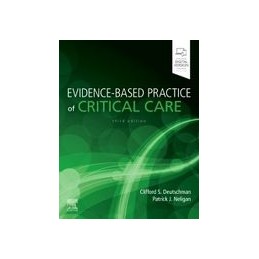- Reduced price

Order to parcel locker

easy pay


 Delivery policy
Delivery policy
Choose Paczkomat Inpost, Orlen Paczka, DHL, DPD or Poczta Polska. Click for more details
 Security policy
Security policy
Pay with a quick bank transfer, payment card or cash on delivery. Click for more details
 Return policy
Return policy
If you are a consumer, you can return the goods within 14 days. Click for more details
Approach any critical care challenge using a practical, consistent strategy based on best practices with Evidence-Based Practice of Critical Care, 3rd Edition. Unique, question-based chapters cover the wide variety of clinical options in critical care, examine the relevant research, and provide recommendations based on a thorough analysis of available evidence. Drs. Clifford S. Deutschman and Patrick J. Nelligan, along with nearly 200 critical-care experts, provide a comprehensive framework for translating evidence into practice, helping both residents and practitioners obtain the best possible outcomes for critically ill patients.
Data sheet
